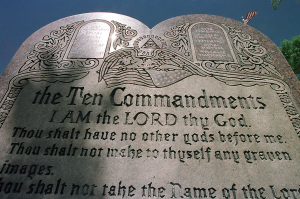What Does Christian Libertarianism Look Like?
Stereotypes and broad brush labels are common in the current political climate. If someone says they believe homosexuality is a sin and that drugs ignite societal problems, they would almost immediately be placed in the “Christian right-wing” category. If another person says that the government should not be in the marriage business and that drugs should be decriminalized, then that person would likely be labeled a “liberal.”
But what if a person believes both sides of the argument?
Enter the Christian libertarian.
A Christian libertarian is generally aligned with the core moral beliefs of Christian conservatives but emphasizes free will to the extent that they are considered socially liberal.
However, there are many Christians, on both sides of the political aisle, who have taken aim at the Christian libertarian, saying that they do not practice true Christianity with their political philosophy.
The Biblical Case Against Christian Libertarianism
Dr. Richard Land, president of the Ethics & Religious Liberty Commission of the Southern Baptist Convention and executive editor of The Christian Post, said that “of course libertarians can be Christians – but so can racists.”
“If you are a Christian and a libertarian, you would have to basically ignore all of Romans 13 where God lays down a specific role that the government is divinely ordained to play which is to reward those who are right and punish those who are evil.”
“Libertarians are not being consistent in applying the Bible to their thought process,” Land contended
The government not only has a right, he said, but is called upon by God to regulate societal morality.
“Slavery was outlawed by the government. Is that not a moral issue? There are laws against rape, murder, theft … all of these are moral issues that the government has and must regulate.”
The evangelical leader argues that libertarians compartmentalize their faith when their Christian faith must be first and foremost in every aspect of their life – even in politics and government.
Many Christian libertarians, for instance, argue that sin that is “victimless” – such as drug use – should not be made illegal because users knowingly chose to use the substance on their own accord, and by exercising their free will poorly, they will also have to suffer the consequences.
Conservative Christians, however, do not see any sin as “victimless” and argue that Christianity by its very nature affirms the idea of corporate solidarity. Therefore, every action, or lack of, has a ripple effect on society, which impacts the lives of others.
According to the Christian Right, libertarians put too much emphasis on individual liberties and not enough on the consequences those liberties could have on society.
The Biblical Case For Christian Libertarianism
Doug Bandow, senior fellow at the Cato Institute, told The Christian Post that he disputes the idea that there is no such thing as Christian libertarianism.
“The greatest commandment is to love God and the next greatest is to love our neighbors as we love ourselves. Nothing in Scripture suggests that we have to have a political institution to make that happen. There is no inconsistency with a political libertarian philosophy and the Christian religion,” Bandow argued.
While he agrees that religious thought should not be and cannot be banned from the public square as everyone has a set of moral values and these values inevitably shape our society, he also believes that mixing the two institutions of church and state is dangerous. In one way or another, according to Bandow, Christian conservatives and Christian liberals have mixed the two institutions and as a result both have been corrupted.
Christian libertarians argue that their stance emphasizes free will, which is an important aspect of the Bible, in all areas of political policy – even in those that they may personally and morally disagree with.
Theodore Beale, columnist at World Net Daily and reportedly a Southern Baptist, argues in favor of libertarian thought and its consistency with Christianity:
“Libertarianism is not inherently godless. In fact, it is the only political philosophy that is truly in accordance with Christianity,” argued Beale. “The Christian religion posits an all-powerful God who nevertheless permits humanity to turn its back on Him. This shows an extreme respect for free will and for the very sort of individual choice that is banned by Democrats and Republicans alike as they attempt to enforce their will upon the people through the power of government.”
Many Christian libertarians go on to dispute the argument that the federal ban on murder and theft has anything to do with morality. Christian libertarian scholars often state that while murder and theft are indeed issues of morality, they are also issues of individual liberties which is the real reason why the government has the right to ban them. On the flip side, adultery and drinking can be considered issues of morality within the Christian Church, but because they do not infringe upon the individual liberties of others, they cannot practically be banned. After all, many Christian libertarians argue, the government went down that road with prohibition and that law turned out to be the ultimate failure.
So while some extreme aspects of libertarianism might argue for a more anarchist society, Christian libertarians generally recognize the need for limits.
“The basic principle of libertarianism is not anarchic. There are real limits,” said Beale. “My free will ends where yours begins. Neither the community nor I have any claim whatsoever on your property or your life. And a libertarian legal system would be structured around that principle.”




























